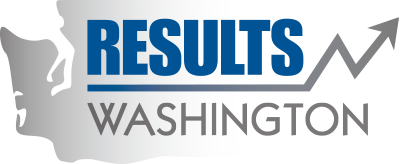Why do we need performance measures?
There are several reasons to measure, monitor and report on the progress and status of our work, including:
- It’s the law.
- It’s the right thing to do as public servants.
- It allows for more informed budget decisions.
- It creates better management of programs and services within agencies.
- It creates transparency and shared understanding between government and the public.
It’s the law. Washington’s budget law requires agencies to measure performance and report measures alongside budget information:
Revised Code of Washington (RCW) 43.88.090 states:
(2) Each state agency shall define its mission and establish measurable goals for achieving desirable results for those who receive its services and the taxpayers who pay for those services. [. . . .]
(3) For the purpose of assessing activity performance, each state agency shall establish quality and productivity objectives for each major activity in its budget. The objectives must be consistent with the missions and goals developed under this section. The objectives must be expressed to the extent practicable in outcome-based, objective, and measurable form.
[. . . .] Objectives must specifically address the statutory purpose or intent of the program or activity and focus on data that measure whether the agency is achieving or making progress toward the purpose of the activity and toward statewide priorities.
In addition, RCW 43.06D.040 requires performance measures that allow the determination of our effectiveness in reducing disparities.
It’s the right thing to do as public servants. We measure many aspects of our lives outside work, both to check progress towards our goals and to monitor for emerging issues.
For example:
- Our children regularly bring home measures to help us understand their progress and barriers at school (i.e., test scores and report cards).
- We get monthly measures on our households to show progress on our goals and highlight potential issues (i.e. investment performance, water and electricity usage, etc.).
- We monitor our health through a variety of measures that tell us what’s happening inside our bodies (i.e. weight, blood pressure, and cholesterol levels).
Work is no different; measuring our progress and monitoring for emerging problems should be what we do to assess if our services are working and identify potential changes that may be needed to improve results.
It allows for more informed budget decisions. The Office of Financial Management (OFM) requires agency budget requests to be linked to performance measures so budget analysts can understand what results or improvements to expect from an investment of resources. This carries out the Legislature’s policy that each agency's budget recommendations must be directly linked to the agency's stated mission, goals and objectives, and that agency budget proposals must integrate performance measures “that allow objective determination of an activity's success in achieving its goals,” as stated in RCW 43.88.090(5). In addition, OFM uses performance data as criteria for assessing which activities are most effective, and thus, should be the highest priority for investment.
OFM has built data systems to help agencies meet these requirements. Agencies use the Activity system to describe their work activities and expected results, and then create performance measures in the Results through Performance Management (RPM) system to tell a story about this work. Budget requests must describe incremental changes in performance that can be expected from the investment.
It creates better management of programs and services within agencies. Performance measures tell leaders something important about the agency’s products, services, and business processes. Measures are a tool to help learn, grow and improve.
Effective performance measures enable us to:
- Monitor performance to identify barriers and issues as they arise
- Track progress towards our goals
- Identify unintended impacts of our decisions
- Adjust our strategies, processes and actions continually to keep improving and adapting to new circumstances
The best performance measures start conversations about organizational priorities, allocation of resources, and ways to improve performance. They answer the questions we need to make decisions at every level of government.
Performance audits by the State Auditor and the Joint Legislative Audit and Review Committee, as well as Results Washington and the Office of Equity, rely on performance measures to determine the results of policies and programs.
It creates transparency and shared understanding between government and the public. With limited resources, government needs the ability to have open conversations about the impact of our work and where we can get the most benefit with what we have. Taxpayers and the Legislature want to make informed spending decisions, and we can’t have those conversations without performance data. Openly sharing our progress and barriers builds trust, making hard conversations easier. This fosters true accountability, at every level of government, that is based on our priorities, values, and the best information available. Accountability means telling the truth and improving where we can to serve people better.


 previous
previous